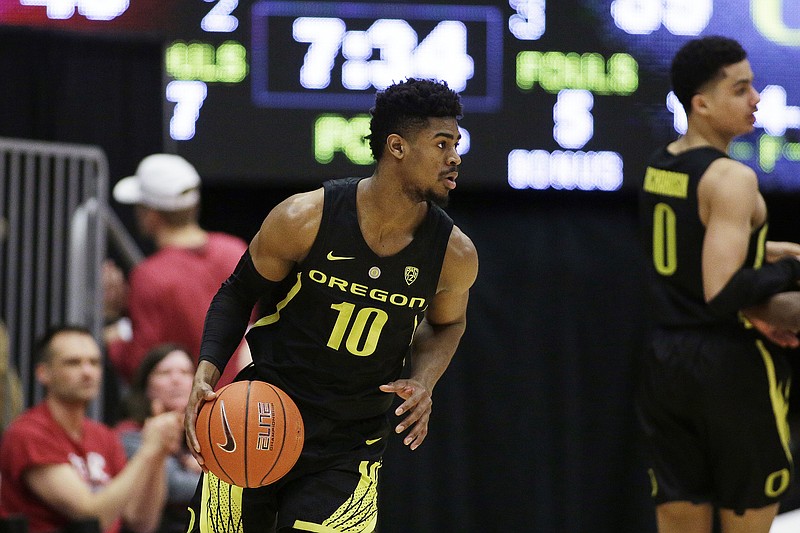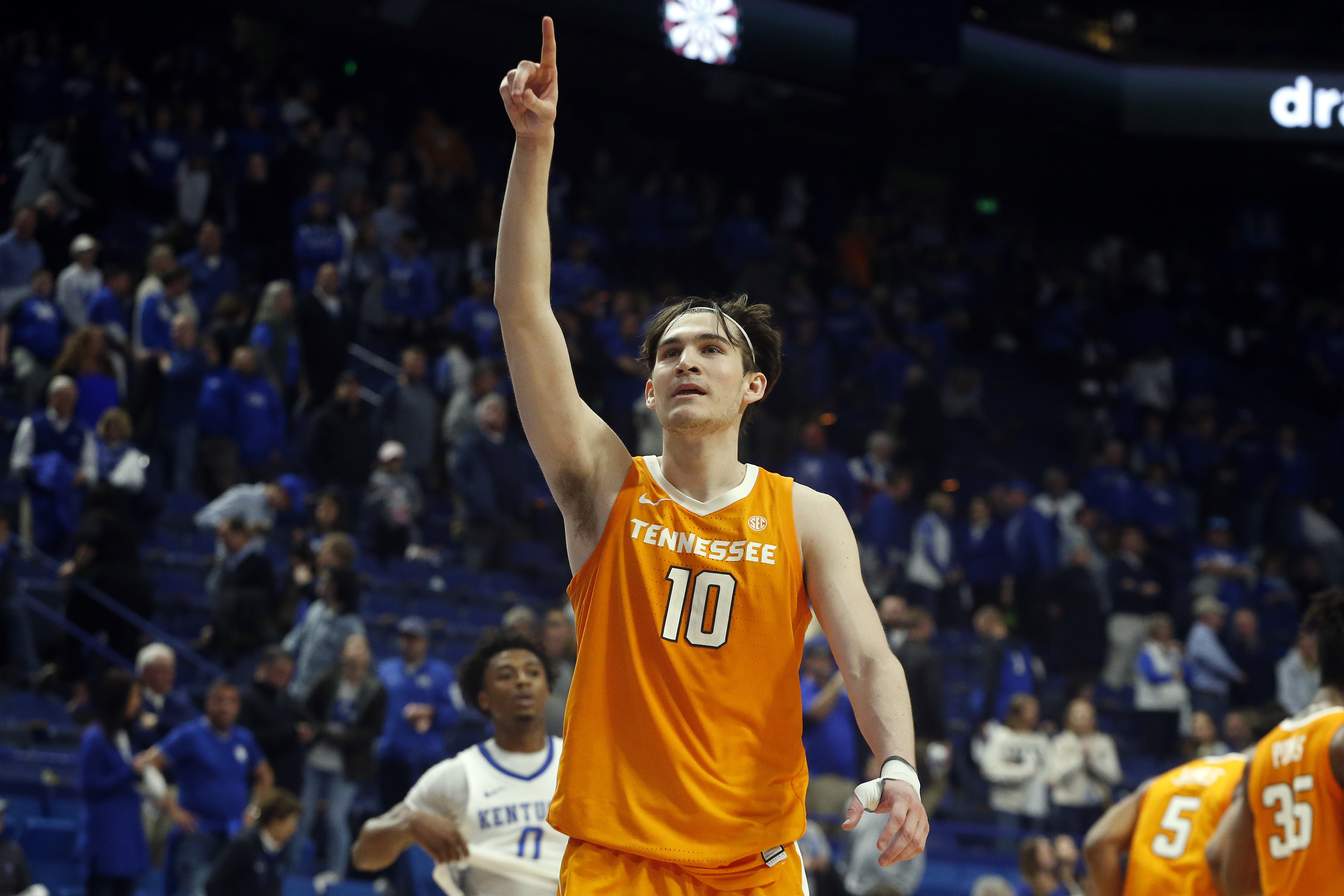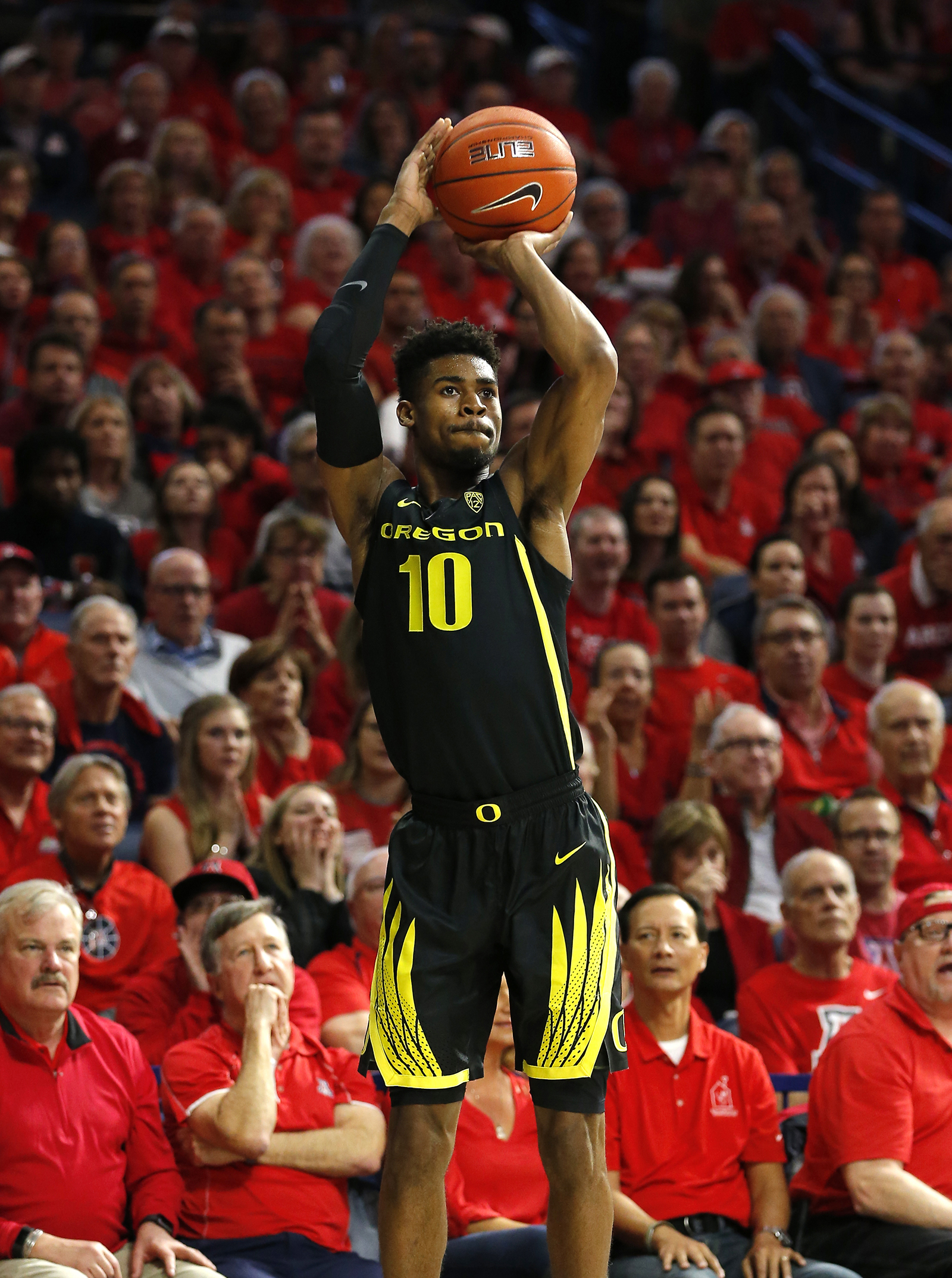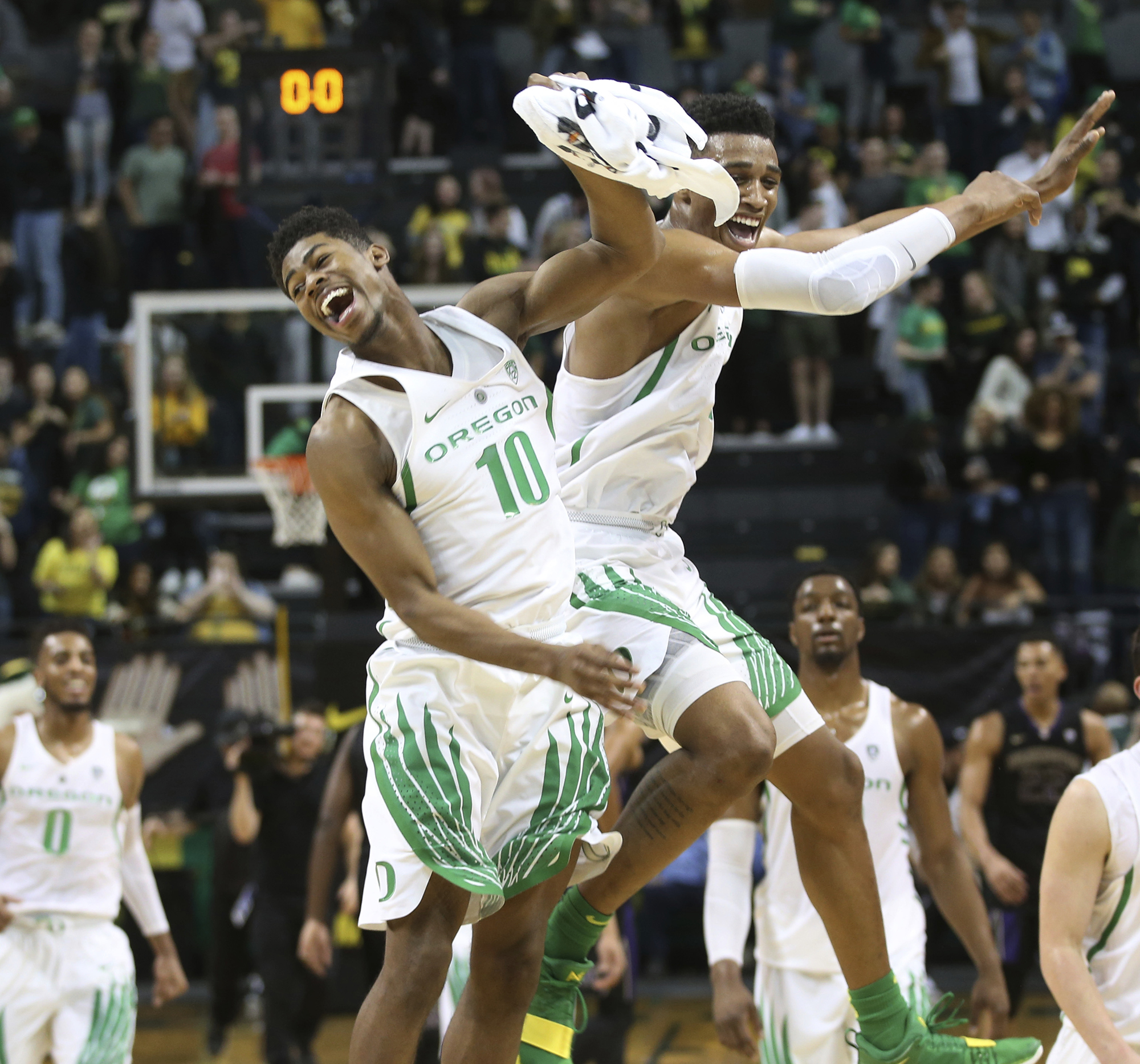 AP photo by Chris Pietsch / Oregon basketball teammates Victor Bailey Jr., left, and Kenny Wooten celebrate after the Ducks beat Washington 65-40 on Feb. 8, 2018, in Eugene, Ore. Bailey transferred to Tennessee last year and sat out the 2019-20 season per NCAA rules, but he could be a big part of the Vols' 2020-21 season and their hopes for a deep tournament run.
AP photo by Chris Pietsch / Oregon basketball teammates Victor Bailey Jr., left, and Kenny Wooten celebrate after the Ducks beat Washington 65-40 on Feb. 8, 2018, in Eugene, Ore. Bailey transferred to Tennessee last year and sat out the 2019-20 season per NCAA rules, but he could be a big part of the Vols' 2020-21 season and their hopes for a deep tournament run.Amid the talk of returning players and a highly touted signing class, the Tennessee men's basketball program's aspiration of a deep NCAA tournament run next year may rest on the shoulders of the often forgotten Victor Bailey Jr.
Long postseasons have been rare for the Volunteers, who have reached the Sweet 16 on eight occasions, the Elite Eight just once and never gone further in the NCAA tourney. Their roster for the 2020-21 season, though, is one that should make their fans set their sights higher than simply beating rivals.
After a dip this past season, Tennessee could again be among the best programs not only in the Southeastern Conference but the country.
To contend for a national championship, however, will depend largely on someone who has yet to play a game for the Vols: Bailey, the 6-foot-4, 186-pound former Oregon Duck who sat out the 2019-20 season due to NCAA transfer rules and will be a redshirt junior next school year.
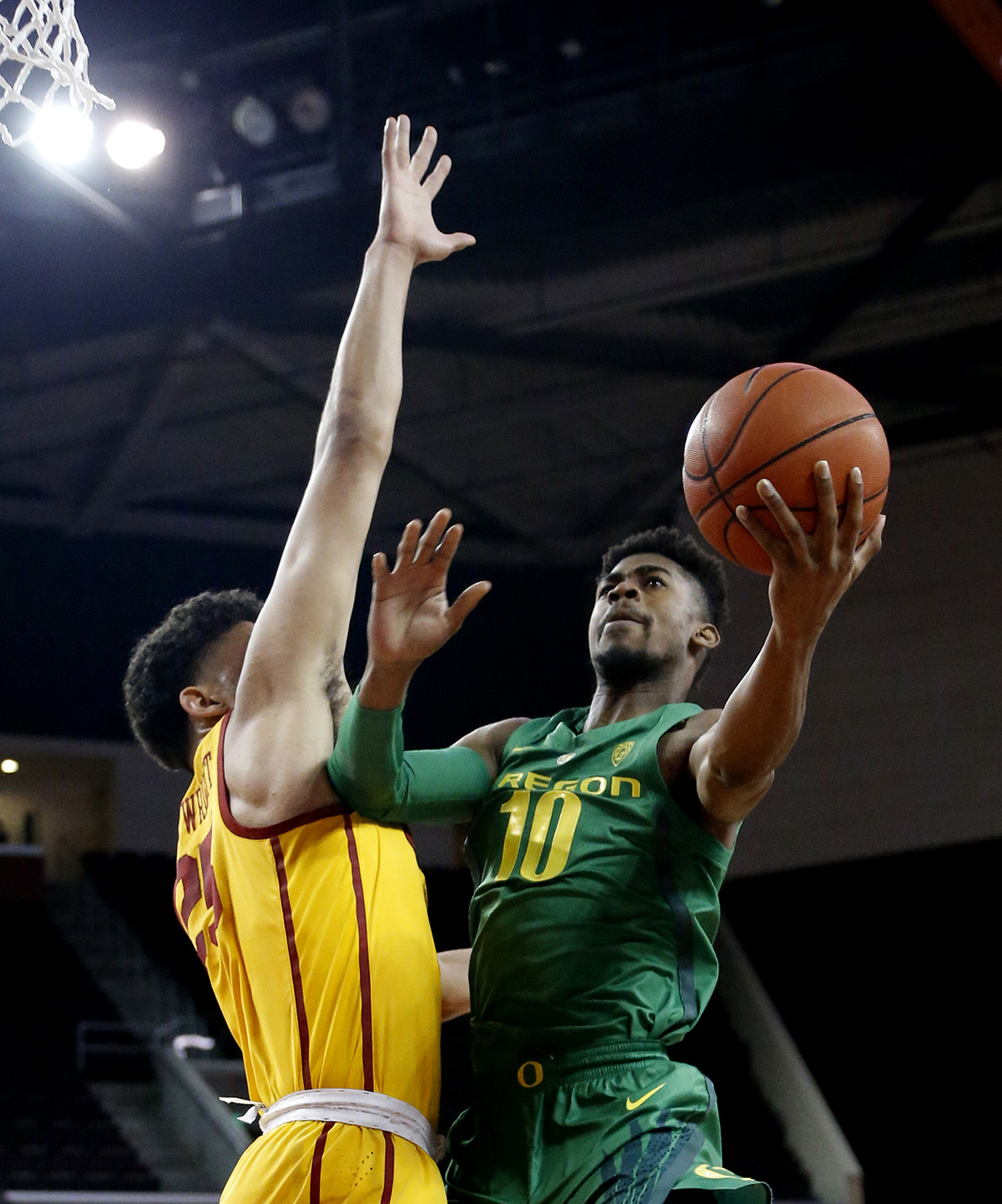 AP photo by Ringo H.W. Chiu / Oregon's Victor Bailey Jr. drives to basket against Southern California's Bennie Boatwright on Feb. 21, 2019, in Los Angeles. Bailey, who transferred to Tennessee last year, brings postseason experience after playing for one Ducks team that reached the NCAA tournament and another that played in an NIT.
AP photo by Ringo H.W. Chiu / Oregon's Victor Bailey Jr. drives to basket against Southern California's Bennie Boatwright on Feb. 21, 2019, in Los Angeles. Bailey, who transferred to Tennessee last year, brings postseason experience after playing for one Ducks team that reached the NCAA tournament and another that played in an NIT.Why he matters
A look back at the past 10 national champions shows the importance of experience on the perimeter when it comes to winning in March.
The game's evolution has decreased the need for a big man who plays with his back to the basket while at the same time emphasizing the importance of versatile wings capable of making shots and playing on both ends of the floor. In the past decade, only one post player has been named Most Outstanding Player of the NCAA tournament: Kentucky's Anthony Davis, a transcendent talent who went on to be a No. 1 draft pick in the NBA, where he has been a perennial standout.
So it's hard to envision a team built around post play being a real factor in March.
Likewise, only two freshmen - Davis in 2012 and Duke's Tyus Jones in 2015 - have received the MOP honor. So while the one-and-done college players are nice to have for TV ratings, ticket sales and excitement, they don't always equal postseason success. Even the national championship teams led by Davis and Jones had experienced perimeter players whose importance showed down the stretch: Kentucky senior Darius Miller averaged 11.7 points on 55% shooting during the 2012 NCAA tourney, and Duke senior Quinn Cook was an All-American in 2015.
It's easy for Tennessee fans to get excited about the potential of incoming freshmen, such as guards Keon Johnson and Jaden Springer, and older players who have shown notable progress, such as forwards John Fulkerson and Yves Pons, who has entered his name in the NBA draft pool. Still, the evidence suggests the key to a deep run will depend more on a player in Bailey's role.
Rewinding 2019-20
After a combined 57 wins in 2017-18 and 2018-19, Tennessee took a step back this past season - coach Rick Barnes' fifth in Knoxville - with a 17-14 record for a team defined more by youth and roster turnover than anything else. The Vols entered the schedule with the sort of playmaking guard in senior Lamonte Turner who could have been special come March, but he never was fully healthy and ended his season in late December to have surgery for a chronic condition.
At his healthiest, Turner made the game easier for his teammates. But as the season progressed, opponents realized he was incapable of effectively shooting, which in turn took away his ability to penetrate to the basket. Two games after Turner announced the end of his collegiate career, Santiago Vescovi became a midseason on-court addition for the Vols, but the 6-3, 188-pound freshman from Uruguay did not make up for the lack of a penetrating scorer.
Vescovi shot 36% from 3-point range, made multiple 3s in nine of 19 games he played and was exciting at times. He also was equally careless, totaling almost as many turnovers (67) as assists (70), a deficiency owing in part to when he joined the team but also to his tendency to take risks during games in hopes of making plays.
The team was at its best when Josiah-Jordan James was effective on the court, something that was rare in the 6-foot-6, 208-pound guard's first college campaign. In the Vols' second matchup with Kentucky this past season, a game Fulkerson dominated on offense, James finished with 16 points, seven rebounds, five assists, two steals and a block. He also was a team-best plus-19 in 30 minutes in the 82-76 win over the host Wildcats, meaning the Vols were outscored by 13 points in the 10 minutes he was off the court.
Fulkerson has shown he can be a big part of the game plan, especially after becoming the go-to player down the stretch and averaging 18.3 points over his final 10 games. If Pons returns and he and Fulkerson continue their upward trajectories, the Vols will be a top-level team next season. But three senior forwards (including the recent addition of Sacred Heart graduate transfer E.J. Anosike) on a roster otherwise stocked with underclassman guards will only take them so far.
Which brings things back to Bailey.
Just what they need
The former Duck from Austin, Texas, has experience, having played in 73 college games. Bailey has proven to be a knock-down shooter, with 79 career 3s at a 38% clip. He has been to the national postseason, having been on one Oregon team that played in the National Invitation Tournament and another that advanced to the NCAA's Sweet 16.
It's possible, if not likely, that he comes off the bench next season, but he's the type of player who is capable of playing both guard spots and giving Tennessee 25 to 30 minutes in any given game.
His presence still doesn't give Tennessee a true point guard - James, Johnson, Springer and Vescovi are all more combo guards - but it does offer the Vols another ball-handler to complement the abilities of those around him.
And having multiple options to handle the ball, make shots and create them for others was the biggest thing the Vols lost when they lost Turner.
While figuring out the NCAA tournament is far from an exact science - there's a reason it's called March Madness, with upsets always possible - there's usually a common trend to teams that make runs in postseason tournaments.
And Tennessee's key is Bailey.
Contact Gene Henley at ghenley@timesfreepress.com. Follow him on Twitter @genehenley3.
